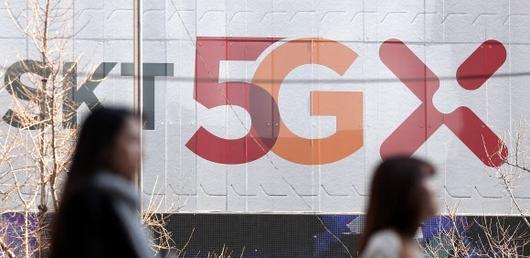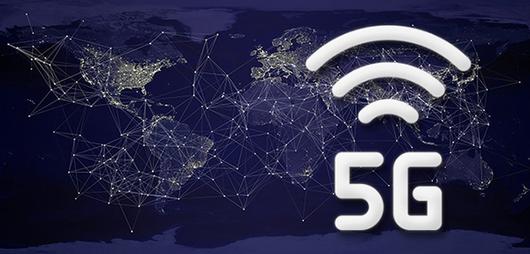 |
[Photo by Yonhap] |
<이미지를 클릭하시면 크게 보실 수 있습니다> |
SK telecom Co. is likely to withdraw from the 5G project using 28 gigahertz (GHz) band at the end of this month, joining peer telecommunications carriers KT Corp. and LG Uplus Corp.
According to the Ministry of Science and ICT and industry sources, SK Telecom had installed 1,605 units of 28 gigahertz equipment for the 5G network as of November, but has not installed any new equipment since April. Given that more than 13,400 units are needed to be installed to meet the mandatory 15,000 units by the end of the month, SK Telecom has in effect withdrawn itself from the project.
“It is practically impossible to utilize 28 GHz for business-to-consumer (B2C) transactions,” said the carrier, indicating its unwillingness to meet the mandatory number of installations.
With SK Telecom’s withdrawal from building the 28 GHz band network, there will be no other carriers remaining, as KT and LG Uplus have had their 28 GHz band allocations revoked in December. “If SK Telecom also fails to meet the number of mandatory equipment installations by the end of May, they will also have to initiate an allocation revocation process after a set of hearings,” said one ICT ministry official.
The 28 GHz frequency band for 5G communications has gained attention as it theoretically enables 20 gigabyte per second (GBps) download speeds. However, it has only been adopted in a limited manner in some highly-developed settings, like at Super Bowl stadiums in the U.S., as the high-band range requires dense equipment installation and technical improvements for its broader adoption.
The band range for 5G networks is divided into 28 GHz and 3.5 GHz. The high-frequency 28 GHz band can realize 20 times faster 5G communications, but it is expensive because it requires a dense base station population. The three telecommunications providers were awarded 5G 28 GHz networks by the ICT ministry in 2018, but eventually chose not to fulfill their mandatory participation, a condition of the allocation, following profitability evaluations due to cost burdens, leading to a revocation of all three allocations five years later.
Under the current law concerning radio frequencies, a frequency can be leased or transferred to a third party three years after it is allocated. This means that the 28 GHz band could have been leased or transferred to a third party since the end of 2021, but the three carriers treated the 571.1 billion won ($428.3 billion) they had paid for the 28 GHz project as losses in 2020, out of belief that there would be no demand in the market for the high-band range.
 |
[Photo by MK DB] |
<이미지를 클릭하시면 크게 보실 수 있습니다> |
The carriers are responsible for the losses prima facie, but there is criticism that the allocations came too hastily in 2018, without going through a proper assessment of the business prospects for the high-band networks, driven by the obsession to be the world’s first to commercialize all 5G frequencies in 2019.
The ICT ministry, however, says that there were sufficient discussions with the industry concerning the matter, and that it was in fact those carriers that wanted and requested 800 MHz, while the government was reviewing various options in the broad range of 400 to 800 MHz. The 600 billion won raised from allocating the 28 GHz frequency band was mostly spent on research and development in the areas of IT and communications, according to an official from the ministry.
Following SK Telecom’s withdrawal, the government is now trying to seek new operators for the 28GHz band. The government believes that public goods, like frequencies, should be utilized, and, at the same time, that there is policy-wise necessity to build the 28GHz network and foster related industries for the transition to 6G.
The government is providing incentives for new operators with cheaper up-front costs. The three telecom carriers spent about 500 billion won each for the 28 GHz band network project: 200 billion won for the allocation and 300 billion won for the installation, including 15,000 mandatory units, based on the price of 20 million won per unit.
New operators will be able to enjoy a smaller number of mandatory units, in addition to low-interest rate loans, tax credits up to 15 percent, and exclusive use of the frequency for three years. The ICT ministry plans to announce the new frequency allocation plan by June and select new operators in the fourth quarter.
However, some communication industry insiders are skeptical whether any new operators will appear, due to its “hardly profitable” business prospects, despite the government’s aggressive perks.
이 기사의 카테고리는 언론사의 분류를 따릅니다.
기사가 속한 카테고리는 언론사가 분류합니다.
언론사는 한 기사를 두 개 이상의 카테고리로 분류할 수 있습니다.
언론사는 한 기사를 두 개 이상의 카테고리로 분류할 수 있습니다.


